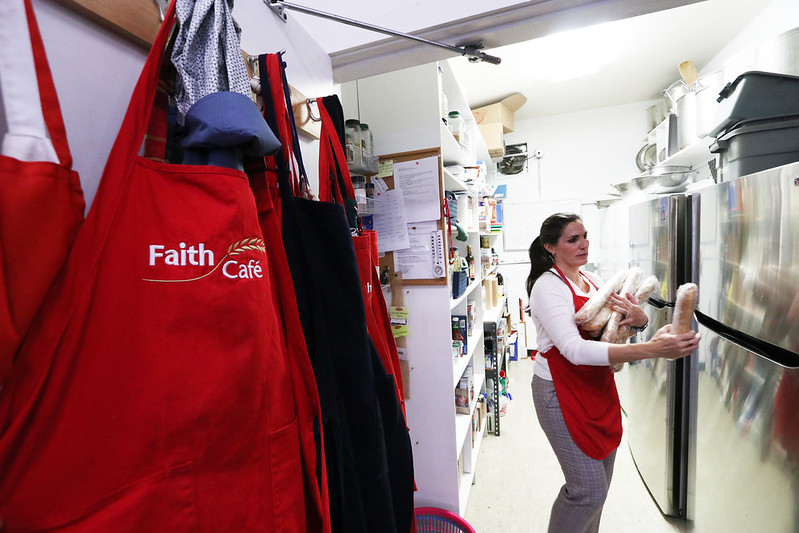What an organized and compassionate group can achieve
More than two decades ago, a group of Catholic parishes in Portland’s western suburbs sent delegates to a retreat. The topic? Nothing less than how to further social justice.
Out of that big idea emerged four areas of focus: voter education, promoting peace, affordable housing and hunger.
The final category gave rise to a lasting project. Faith Café, an ecumenical weekly meal and social time for low-income people, has endured for almost 20 years and steadily has convened a wide array of guests and volunteers who treasure it.
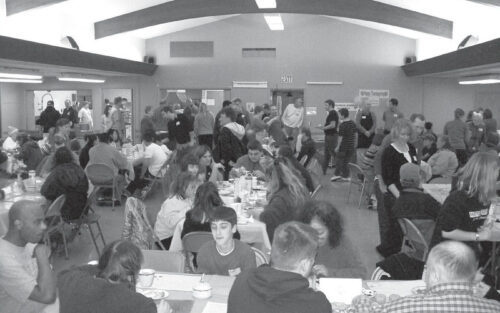
Meals are served every Sunday afternoon at Bethel United Church of Christ in Beaverton, starting at 4:15. A line begins to form under a covered walkway at about 1:30. Volunteers have rarely missed a Sunday, even during the pandemic and nasty weather.
“We are feeding our neighbors more than a meal,” says Sarah DiCarlo, a west-side Catholic who volunteers at Faith Café and serves on the board. What DiCarlo means is that friendships develop as part of a deep commitment to recognizing human dignity.
“We tell volunteers to talk to people and let them know they are valuable,” says Lori Smith, a board member and volunteer from the Church of Jesus Christ of Latter-day Saints. “I think they get dumped on all the time. If someone smiles and shows them that we care and that they matter — that means more than the food sometimes.”
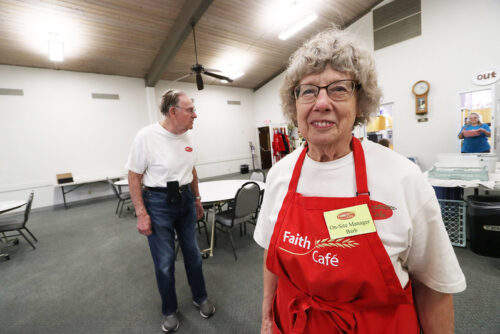
The need for food and human companionship has only grown over two decades, says Barb Upson, the St. Juan Diego parishioner who was in on the beginning of Faith Café and has remained as the project’s spark plug.
Upson gets credit for keeping Faith Café purring through hard work, innovation and partnerships. She does the small but necessary things.
“Barb is so humble,” says Catherine Moore, a St. Juan Diego parishioner and current president of the board. “This program would not be running without her.”
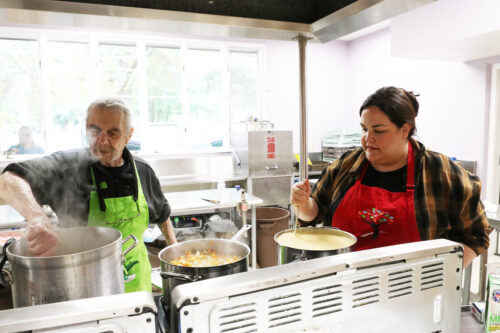
The start of Faith Café came at a remarkable time at a new parish, says Father John Kerns, founding pastor of St. Juan Diego. He convened that social action retreat in 2004.
“There were no buildings at all. Not even a church yet,” says Father Kerns, now pastor of Our Lady of the Lake Parish in Lake Oswego. “But parishioners had compassion, a zeal for service and organizational skills.”
The team identified First United Methodist Church in Beaverton, which did have buildings as well as enthusiasm for serving meals. What the Methodists lacked was people. For that, the Catholics came through. In addition, St. Juan Diego committed 5% of all its income to those living in poverty. Part of that money helped sustain Faith Café.
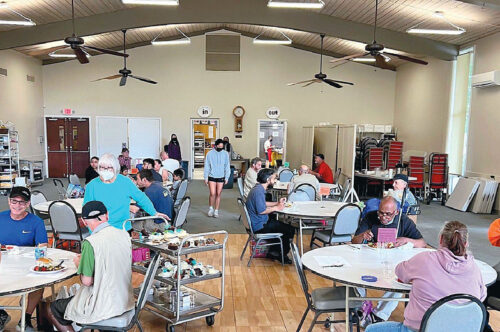
For the first meal, only one person showed up. But word soon spread of the warm atmosphere.
“The food is so good and the people so kind that I come back every week,” a 94-year-old diner named Norm told the Catholic Sentinel newspaper in 2010. “The volunteers who serve the meals know that I don’t like dressing on my salad, and they know which cookies are my favorite. I have two special women that I call my angels. They like to listen to my stories and treat me like a king.”
Now, an average 100 guests come weekly to Faith Cafe. In 2012, the location moved to Bethel United Church of Christ.
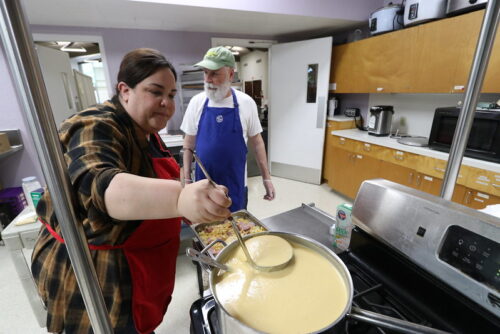
On one October Sunday, Bethel volunteers did the cooking and serving.
Steam rose from two massive pots being stirred by David Syrop and Amanda Sanchez. The smell of baked ham caressed the nose as Leon Taylor opened the oven to check. The Bethel team has been working together for years.
The ecumenical venture includes not only Catholics (including the Sisters of St. Mary of Oregon) and members of the United Church of Christ, but a Filipino cultural society. Each organization brings cooks and servers on their day. The various wards of the Church of Jesus Christ of Latter-day Saints prepare and serve a monthly meal on Thursdays.
“We have different churches, but we are so much more alike than different,” says Moore.
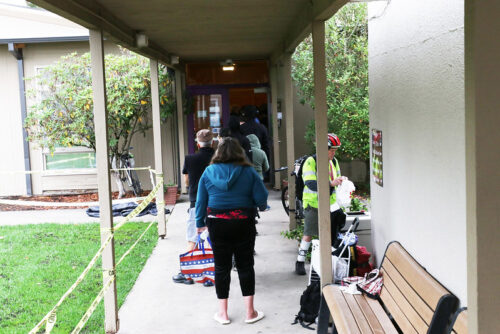
Di Carlo chimes in: “We all work so well together.”
The same guests and volunteers have been coming for years.
“The regulars who come are so comfortable here,” says Di Carlo. “They know they are welcome, and we really care about them.”
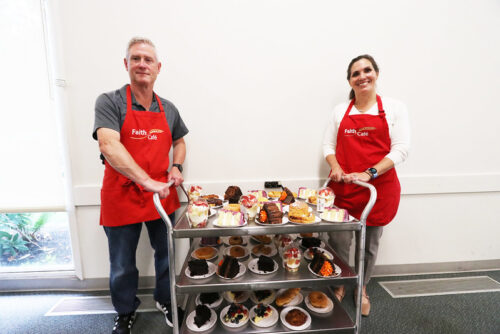
Anne-Marie Kiriazis, another board member, recalls the diner who found a job, did well, then came back to volunteer.
Another longtime guest, a quiet gentle man who often helps, may be invited into leadership. “He brings a different perspective of someone who has been on the streets before,” says Moore. “I think he enjoys it here. We treat everybody with respect.”
For their part, volunteers are a mix of retired and working people, with even a few young students.
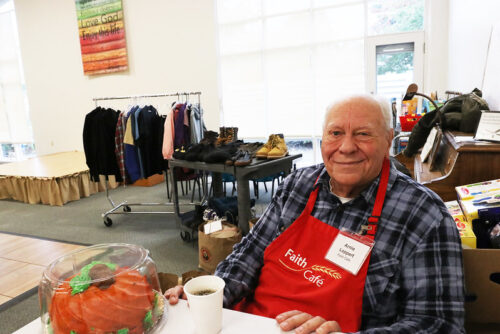
One married Catholic couple volunteer faithfully. Jill and Jeff Ralston moved to the Vancouver, Washington area three years ago, but have remained active at St. Juan Diego and still volunteer at Faith Café.
“I love it,” says Jeff. “It’s about helping people.”
“We establish relationships with our guests, which is so rewarding,” says Jill. “The majority of them we know by name. And if they don’t show up, we reach out, concerned for them and how they are doing in the community. I think that just takes it to another level.”
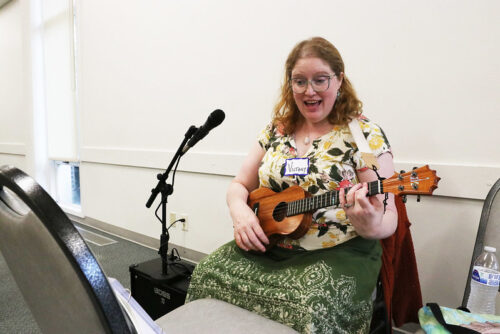
One never knows what diners may want to talk about. One nervous father-to-be inquired about how to raise children. The volunteers’ hearts melted and told him: “Love them and have a lot of patience.”
Upson says that volunteers learn a lot from speaking with guests. “They might be talking to someone who was president of a company,” she explains. “They are surprised and then they realize that that could be any one of us.”
There are no food lines here.
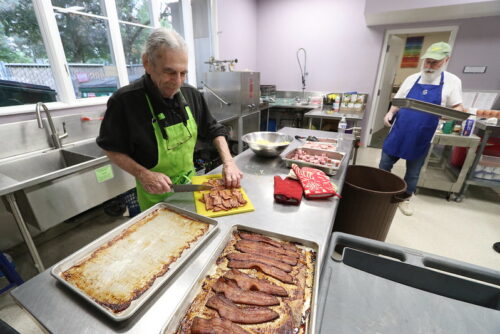
After coming inside, guests walk past a giveaway table laden with food or toiletries. Then they swing past Arnie’s Boutique, a set of tables and racks overseen by longtime volunteer Arnie Leppert. There, they enjoy a chat with the amiable Arnie before selecting shoes, clothes, blankets or other necessities for life in the rough.
Then, as at a restaurant, they take a seat at a table with placemats decorated whimsically for the day by none other than Upson. A volunteer brings a steaming plate of food and places it on the mat.
Board member Lindi Krantz says table conversations between volunteers and guests often lead to identifying other needs that volunteers can address.
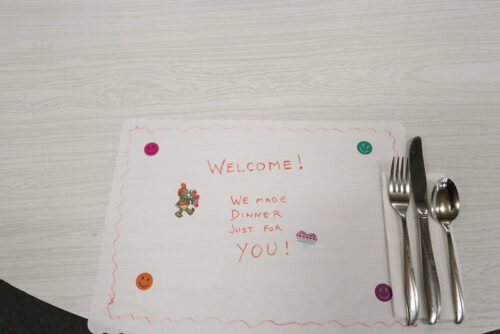
Hours before guests arrive, the volunteer cooks get going. The menu and supplies have been set in place by Faith Café’s only paid staffer. The kitchen rings with utensils and aromas that grab the hungry soul by the lapels.
If guests are leery about eating in a communal setting, they can get a meal in a box and take it to their tent, trailer or apartment. But most eat in, drawn by the communal love.
When first-time diners arrive, they often look for the cafeteria line. Volunteers come and tell them, “Have a seat. Relax. We serve you.”
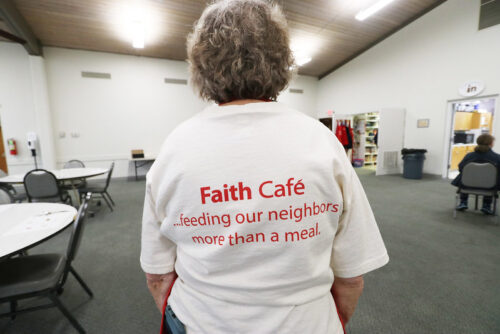
Tension melts from guests’ faces as they are greeted and then tuck in to tasty dinners made of supplies from the Oregon Food Bank and the LDS church’s Deseret Industries.
After diners eat, they can get another meal in a box to take home.
About 10% of those who eat are homeless. The rest live in RVs or low-rent apartments.
One day, Upson was riding the MAX train. On board, she saw a regular Faith Café diner and struck up a fun conversation. As she got off the train, the man said quietly, “Thank you for acknowledging me in public.”
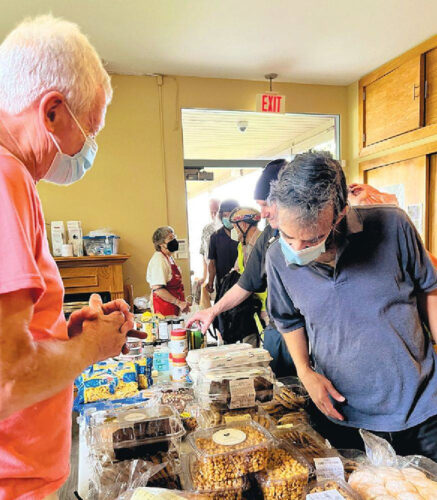
Keen organization and a reasonable workload for volunteers seem to be two of the reasons Faith Cafe has lasted. Teams need to come only once every seven weeks. There are about 150 volunteers total.
That number is impressive, says Moore, given that it’s harder to find volunteers to serve homeless people than, for example, to help animals or children.
Matt Cato, an early volunteer at Faith Café and former director of the Office of Life, Justice and Peace for the Archdiocese of Portland, says that what he likes most about the project is that volunteers “treat each person as their own person … not an amorphous group of people classified as hungry.” He moved out of his comfort zone and became a greeter.
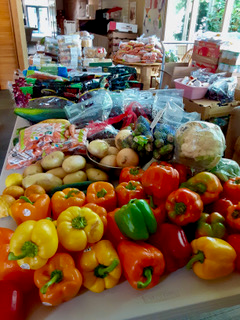
“I loved it,” says Cato. “It is the ‘encounter’ that Pope Francis keeps charging us to do. “So how do I see the role of Faith Cafe in the world? As a welcome opportunity for a few hours of encounter, conversation, food, and camaraderie.”
On one September Sunday, a man who had just eaten at Faith Café came to speak with volunteers. “He was so gracious and grateful,” recalls Smith. “He said ‘I just can’t thank you enough. We had a new baby and have diaper and formula expenses, and you have no idea how much this food helps us.’”
Upson wants Faith Café to inspire other social action.
“I would hope that people would see that a group could get together and could really help to solve a problem,” she says. “That was our aim to begin with. I can see other Catholic parishes looking at us and picking another problem that needed some help and using this model to help solve the problem.”
